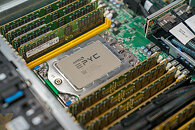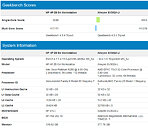Friday, January 8th 2021

AMD 32-Core EPYC "Milan" Zen 3 CPU Fights Dual Xeon 28-Core Processors
AMD is expected to announce its upcoming EPYC lineup of processors for server applications based on the new Zen 3 architecture. Codenamed "Milan", AMD is continuing the use of Italian cities as codenames for its processors. Being based on the new Zen 3 core, Milan is expected to bring big improvements over the existing EPYC "Rome" design. Bringing a refined 7 nm+ process, the new EPYC Milan CPUs are going to feature better frequencies, which are getting paired with high core counts. If you are wondering how Zen 3 would look like in server configuration, look no further because we have the upcoming AMD EPYC 7543 32-core processor benchmarked in Geekbench 4 benchmark.
The new EPYC 7543 CPU is a 32 core, 64 thread design with a base clock of 2.8 GHz, and a boost frequency of 3.7 GHz. The caches on this CPU are big, and there is a total of 2048 KB (32 times 32 KB for instruction cache and 32 times 32 KB for data cache) of L1 cache, 16 MB of L2 cache, and as much as 256 MB of L3. In the GB4 test, a single-core test produced 6065 points, while the multi-core run resulted in 111379 points. If you are wondering how that fairs against something like top-end Intel Xeon Platinum 8280 Cascade Lake 28-core CPU, the new EPYC Milan 7543 CPU is capable of fighting two of them at the same time. In a single-core test, the Intel Xeon configuration scores 5048 points, showing that the new Milan CPU has 20% higher single-core performance, while the multi-core score of the dual Xeon setup is 117171 points, which is 5% faster than AMD CPU. The reason for the higher multi-core score is the sheer number of cores that a dual-CPU configuration offers (32 cores vs 56 cores).
Sources:
Geekbench 4, via Leakbench, Hexus.net (image)
The new EPYC 7543 CPU is a 32 core, 64 thread design with a base clock of 2.8 GHz, and a boost frequency of 3.7 GHz. The caches on this CPU are big, and there is a total of 2048 KB (32 times 32 KB for instruction cache and 32 times 32 KB for data cache) of L1 cache, 16 MB of L2 cache, and as much as 256 MB of L3. In the GB4 test, a single-core test produced 6065 points, while the multi-core run resulted in 111379 points. If you are wondering how that fairs against something like top-end Intel Xeon Platinum 8280 Cascade Lake 28-core CPU, the new EPYC Milan 7543 CPU is capable of fighting two of them at the same time. In a single-core test, the Intel Xeon configuration scores 5048 points, showing that the new Milan CPU has 20% higher single-core performance, while the multi-core score of the dual Xeon setup is 117171 points, which is 5% faster than AMD CPU. The reason for the higher multi-core score is the sheer number of cores that a dual-CPU configuration offers (32 cores vs 56 cores).


41 Comments on AMD 32-Core EPYC "Milan" Zen 3 CPU Fights Dual Xeon 28-Core Processors
Imagine two 64 zen 3 milan cpus on a motherboard what kind of score they pump, and compare that to intels best and latest xeons. In performance and price.
Intel better be ordering waggons of vaseline.
They will never recover from this and will go bankrupt. It suits them well, if you ask me. Thats what you get for being greedy beyond sense and measure. You end up ordering vaseline !
testbeating is power usage.Also if Intel does disappear, who's going to keep AMD from becoming the new Intel, without competition?
These Epyc processors are much more core dense than Intel, not to mention that AMD now has IPC and overall performance crowns with Zen 3 when compared to any Intel product.
Either way, pretty desperate and doesnt change reality soooo yeah, fail.
Rocket lake S also same thing just leaked Geekbench scores.
You will have to wait for an official launch to get some numbers from a broad range of applications.
Do you know how much money intel has it would take years for them to go bankrupt, they do more than just processors. You don't get to be that big a company without diversifying your revenue stream.
Even with Zen 3 being as fast as it going to be Intel owns 90% of the server market.
Intel Net worth US$240 Billion (2020)
Average cost of a State of the art Fab 3-4 Billion
Intel is not going anywhere.